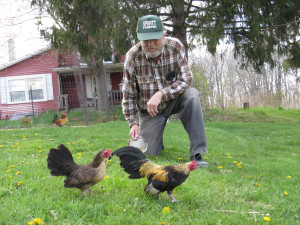
By David Fleet
Editor
Atlas Twp.-It’s an aerial attack that concerns township farmer Steve Spratt.
“Hawks get my chickens and turkeys more often then coyotes,” said Spratt, who for the past 40 years has raised fowl on his Hill Road farm. “But the coyotes are moving closer and closer each year. I can watch them out in the fields. I hear them, too—coyotes are yipping each night. But they seem to have stayed away so far.”
Michigan Department of Natural Resource officials and other Michigan residents would consider Spratt lucky to keep his birds safe after what prompted the state’s Natural Resources Commission to open the hunting of coyotes year-round.
“The Natural Resources Commission has reported an increase in the number of public complaints in both the rural and urban areas of the state,” said John Pepin, deputy information officer for the Department of Natural Resources. “An expansion may help to address the concerns of the local impacts coyotes have on homeowners and residents.”
The change, OK’d late in April, became effective immediately and expands the coyote hunting season to all year round. Previously, it was July 15-April 15. In addition, hunters may take coyotes with numbers three and four buckshot at night. Centerfire rifles can be used during the day but are not permitted at night.
Pepin said the coyote population statewide is at an historic all-time high, and the DNR said the year-round hunt will provide landowners better control over local populations.
“Biologically, the impact on the year round hunt on the overall population is not expected to be that great,” he said. “The change in hunting seasons should provide more opportunity to prevent problems with animals. Also, for those residents in the Upper Peninsula where the deer herd has been on the decline, this change in coyote hunting should make improvements on the life expectancy of fawns.”
According to the DNR, hunting rules, Michigan residents need a valid base license to hunt coyotes, and out-of-state residents must have a valid base license and a fur harvester license. Residents hunting other furbearing species will need a base license and a fur harvester license. Coyotes and raccoons may be killed all year on private property by a property owner or designee when the animals are causing or about to do damage to private property. A license or written permit is not needed. Nighttime hunters must use dogs or the aid of a game or predator call. Dogs cannot be used from April 16-July 7.
Adam Bump is the bear and furbearer specialist for the Michigan Department of Natural Resource (DNR).
“By expanding the hunt there will not be any big change in population,” said Bump. “Coyotes are everywhere in our state and while we have no estimates of population, their habitat has expanded to include many urban areas. Often the coyotes, which have been hunters at night start getting comfortable hunting in the daytime, too. As a result the complaints have increased since people are now simply seeing more animals out in the daylight.”
Jason Bradley, a Groveland Township resident, has been a deer and bear hunter for more than 30 years and supports the change in hunting coyotes.
“It’s very necessary that hunters can take the coyotes and keep the population down,” said Bradley. “I believe every deer hunter should take a few coyotes each year and save a fawn or two. Someone has to do it—they are a predator and they have been allowed to reproduce pretty much unchecked.”
